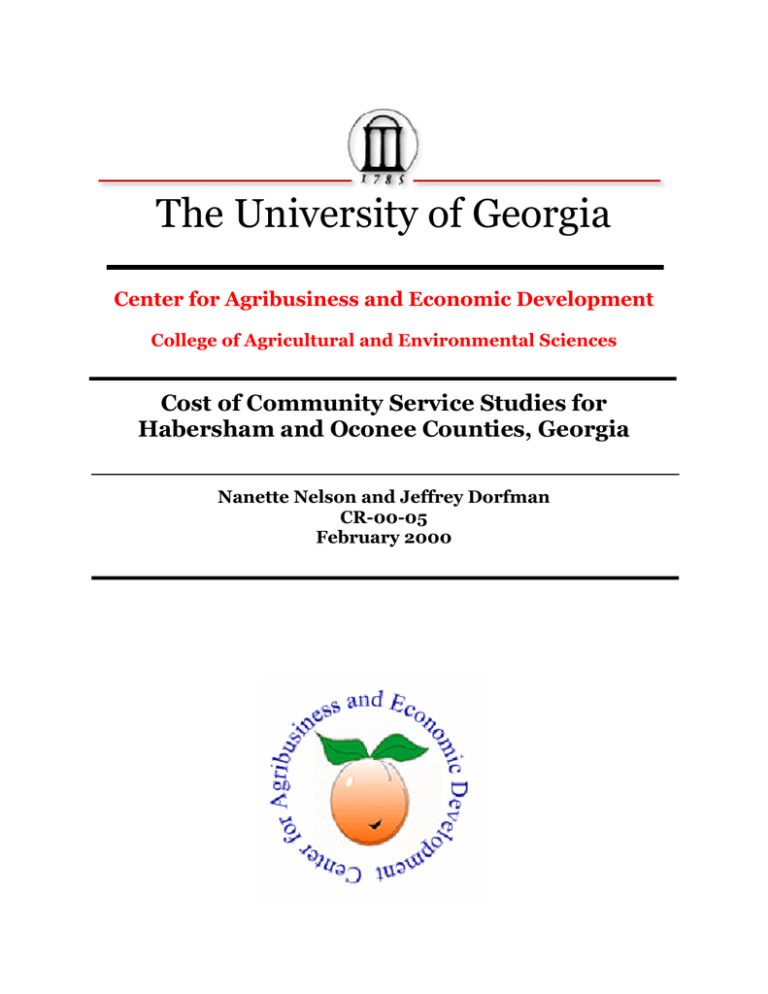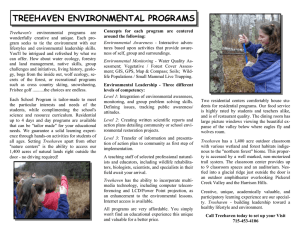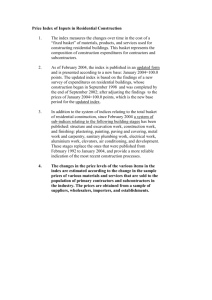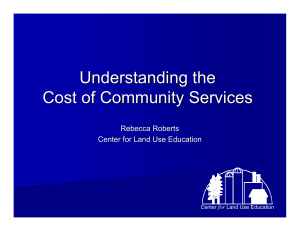The University of Georgia Cost of Community Service Studies for
advertisement

The University of Georgia Center for Agribusiness and Economic Development College of Agricultural and Environmental Sciences Cost of Community Service Studies for Habersham and Oconee Counties, Georgia Nanette Nelson and Jeffrey Dorfman CR-00-05 February 2000 Introduction Growth and development is a fact of life in much of Georgia and a topic of debate across the state. Many areas of the state are concerned that they are being inundated with an overabundance of development; other regions are trying to encourage development and growth as a means to boost their local economy. Unfortunately, many local governments do not fully understand the financial impacts that new growth can have on their budgets. While development brings new tax revenue to a local government, it also results in increased government expenditures. The aim of this study is to provide local governments in Georgia with a set of numbers that can help guide them in making development and planning decisions so that such decisions are made with a full understanding of the fiscal impact of those decisions. To do this, we have performed the first cost of community service studies in the state of Georgia. Cost of Community Service (COCS) studies are simply a reorganization of county municipal records to assign the cost of public services to different classes of land use or development such as residential, commercial, industrial, farm, forest and open lands. The result is a ratio of expenditures-to-revenues for different land use types. COCS studies look at average revenues and expenditures, not changes at the margin, and are thus not capable of predicting the impact of future decisions. Still, they provide the benefit of hindsight, a budgetary baseline from which to make decisions about the future. COCS studies are especially useful in areas undergoing development pressure. For this reason, the counties of Oconee and Habersham were chosen for this study. Our results emphasize the importance of farm and forest lands to a county's tax base. The truth behind increasing residential development is also revealed--more residential development is likely to make a local government's financial situation worse, not better. Calculating Expenditure-to-Revenue Ratios The American Farmland Trust developed COCS studies to support use-assessment programs in the Northeast. Use-assessment programs were initiated to slow the loss of farmland and forestland and more equitably distribute property tax burdens. We followed the methods outlined in Is Farmland Protection A Community Investment? How to do a Cost of Community Service Study (American Farmland Trust, 1993) to complete this study. COCS studies have been completed in over 50 cities or counties around the U.S. To date no studies have been done in the Southeastern U.S. (Virginia is the closest state to Georgia in which a COCS study has been completed.) Three land use categories were defined for this study: residential, commercial/ industrial, and farm/forest/open space. In this study farm houses were included in residential category. Most importantly, this study does not include financial data for schools. The reason for ignoring school revenue and expenditures is that local government and school budgets are maintained separately, so school-related fiscal impacts are not of direct relevance to the local government decision makers. Since planning and development decisions are made by the local government, not the school boards, we decided to focus solely on their fiscal impacts. Budgets were obtained for fiscal year 1998 and 1999 for Habersham and Oconee Counties, respectively. Revenues and expenditures for each county were allocated to land use categories based on the review of available records and interviews of local officials and service providers (see Appendix Table A). The percentage of property tax revenue raised by each land use type was used in allocating a majority of revenues for which local officials could not offer more precise breakdowns (see Appendix Tables B and C). The Oconee County budget listed explicit sources of revenue; thus, an effort was made to get more accurate figures (see Appendix Table C). Expenditure percentages were primarily obtained through interviews. If a percentage breakdown for an expense could not be obtained from an individual or a record search then the percentages calculated for the property tax revenues were used. In assigning the expenditures to different land use categories it is important to note that COCS studies measure the demand for public services, not the public good that is to be gained. The revenues and expenditures were totaled for each land use category and expenditure-to-revenue ratios were calculated . The ratios are presented in Table 1. Table 1 - Expenditure-to-Revenue Ratios (in dollars) County Habersham Oconee Residential 1 : 0.81 1 : 0.92 Commercial /Industrial 1 : 1.04 1 : 1.25 Farm /Forest/Open Space 1 : 1.42 1 : 1.06 Footnote: these figures show the average amount of revenue collected from each development class for each $1 of expenditures spent on services to that development class. Conclusions The expenditure-to-revenue ratios for both Habersham and Oconee Counties suggest that residential land use costs more in services than it generates in revenue. The results also highlight the positive contributions of farm and forest land to these two counties' tax base. Further, these results would become even more skewed away from equity if school revenue and expenditures were included, since all services accrue to the residential development. Residential development would have a larger shortfall in revenue and the other two land-use classes would be overpaying by even more. The implication of these results is that a local government that approves the conversion of farm or forest land to residential development, is likely to face a worsening in its financial condition. While the lure of an increased property tax base is often attractive to a local government when it is considering a request to approve a new subdivision, they must realize that their expenditures will likely rise more than their revenues, resulting in a budget shortfall unless millage rates are increased. The findings of this study should be carefully evaluated in light of the changing character of these rural counties. Other sources of information as well as community input should also be considered in planning for the future. COCS studies are not about promoting one land use type over another. In particular, they are built using average revenues and expenditures and may not reflect the costs and revenue of a particular development project. They do, however, challenge the idea that rural counties must choose development to ensure economic stability. References American Farmland Trust, 1992. Does Farmland Protection Pay? The Cost of Community Services in Three Massachusetts Towns. The Massachusetts Department of Food and Agriculture. American Farmland Trust, 1993. Is Farmland Protection A Community Investment? How to do a cost of community services study. Habersham County Annual Financial Report for the Year Ended June 30, 1998. Prepared by Amos, Kitchens and Co., Certified Public Accountants, Cornelia, GA. Sheriff's Office Monthly Incident Summary Report, August and September, 1999. Consolidation Sheets for County Digest Oconee County Annual Budget 1998 - 1999 Consolidation and Evaluation of Digest 1999 http://www.oconeesheriff.org http://www.oconeecounty.com Table A - Contacts and Interviews Habersham County Kim Canup Health Department Joan Church Tax Assessor Joan Jones Clerk of Court Nell Goss Sheriff's Department Mark Shirley Extension Service Agent Ron Vandiver County Manager Cliff Whitworth Highway Department Oconee County David Anglin Probate Court Len Bernat Operations Director Harriett Browning Tax Commissioner Henry Hibbs Agricultural Extension Agent Mike Hughes Sheriff's Department Debbie Layman Emergency Management John McNally Clean and Beautiful Commission Trisha Smith Economic Development Bruce Thaxton Fire Chief Shawn Wheeler Civic Center Director Joan Whitehead Tax Commissioner's Assistant 1. Nanette Nelson is a graduate research assistant and Jeffrey Dorfman a professor in the Department of Agriculture and Applied Economics, The University of Georgia, Athens, Georgia 30602-7509; phone (706) 542-0754; fax (706) 542-0739; e-mail jdorfman@agecon.uga.edu. Table B - 1 Habersham County Revenues and Expenditures Fiscal Year 1998 GENERAL FUND Revenue (Actual) Taxes Property Other Fines & Forfeitures Intergovernmental Interest General Government Other TOTAL Total 4,583,391 795,700 520,486 332,792 16,573 535,560 230,925 7,015,427 Expenditures GENERAL GOVERNMENT County Commissioner 296,921 Tax Commissioner 196,936 Tax Assessor 196,523 Probate Judge 94,865 Magistrate 61,749 Registrar 46,780 Clerk of Court 320,238 Superior Court 142,740 District Attorney 35,863 Public Defender 166,431 State Court 119,000 Planning and Conservation 160,991 Airport 4,275 County-Wide Expenditures 1,233,455 Data Processing 25,839 County Buildings and Grounds 205,471 PUBLIC SAFETY Sheriff 1,782,609 Central Dispatch 176,325 Emergency Management 135,677 1 Fire Department 226,249 Ambulance Service 292,114 HIGHWAYS AND ROADS Roads and Bridges 860,847 HEALTH Health Department 228,406 WELFARE Inquest 11,336 Relief 50,856 CULTURE AND RECREATION Recreation 293,518 Library 216,673 EDUCATION Extension Service 28,267 CONTRIBUTIONS TO OTHER AGENCIES GA Mountain Planning and Dev 55,625 Forestry Commission 3,363 Other 15,752 Industrial Authority 50,000 TOTAL 7,735,694 RATIO : REVENUE / EXPENSES notes: 1 Estimate based on Oconee County percentages Commercial / Industrial Residential Farm / Forest / Open Space 2,704,201 469,463 307,087 196,347 9,778 315,980 136,246 4,139,102 59% 59% 59% 59% 59% 59% 59% 59% 1,512,519 262,581 171,760 109,821 5,469 176,735 76,205 2,315,091 33% 33% 33% 33% 33% 33% 33% 33% 366,671 63,656 41,639 26,623 1,326 42,845 18,474 561,234 8% 8% 8% 8% 8% 8% 8% 8% 175,183 116,192 115,949 94,865 55,574 46780 188,940 84,217 21,159 166,431 70,210 94,985 2,138 727,738 15,245 121,228 59% 59% 59% 100% 90% 100% 59% 59% 59% 100% 59% 59% 50% 59% 59% 59% 97,984 64,989 64,853 0 6,175 0 105,679 47,104 11,835 0 39,270 53,127 2,138 407,040 8,527 67,805 33% 33% 33% 8% 8% 8% 33% 33% 50% 33% 33% 33% 23,754 15,755 15,722 0 0 0 25,619 11,419 2,869 0 9,520 12,879 0 98,676 2,067 16,438 1,158,696 114,611 128,893 79,187 189,874 65% 65% 95% 35% 65% 623,913 61,714 6,784 79,187 102,240 35% 35% 5% 35% 35% 0 0 0 67,875 0 507,900 59% 284,080 33% 68,868 216,986 95% 11,420 5% 0 11,336 50,856 100% 100% 0 0 0 0 293,518 216,673 100% 100% 0 0 0 0 14,134 50% 0 14,134 50% 32,819 0 9,294 0 5,121,610 59% 18,356 0 5,198 50,000 2,219,417 4,450 3,363 1,260 0 394,667 8% 100% 8% $0.81 59% 66% $1.04 10% 33% 33% 33% 33% 33% 100% 29% $1.42 8% 8% 8% 8% 8% 8% 8% 8% 30% 8% 5% Table B-2 Habersham County Property Tax Revenue Fiscal Year 1998 Summary Residential Commercial / Industrial Farm / Forest / Open Space Total 40% Value 693,895,946 402,678,703 217,593,532 73,623,711 693,895,946 Exemptions 69,511,883 31,503,844 14,283,462 23,724,577 69,511,883 Net Digest 624,384,063 371,174,859 203,310,070 49,899,134 624,384,063 Percent of Total 100% 59% 33% 8% 100% School 2,246,126 4,615,854 6,861,981 Indengent Care 122,627 252,003 374,630 notes: mobile homes incorporated into residential motor vehicles - 85% to residential and 15% to commercial/industrial utility incorporated into commercial/industrial timber incorporated into farm/forest/open space Incorporated Unincorporated Total Budgeted Actual taxes Net Digest 204,379,108 420,004,955 624,384,063 County 1,880,288 3,864,046 5,744,333 5,820,330 5,379,091 Table C - 1 Oconee County Revenues and Expenditures Fiscal Year 1999 GENERAL FUND Revenue Taxes Ad Valorem Sales Other TOTAL Commercial / Industrial Residential 5,686,901 2,040,000 3,235,605 10,962,506 Expenditures GENERAL GOVERNMENT Administration & Finance 512,779 Code Enforcement 262,712 Tax Commissioner 246,406 Tax Assessor 210,153 Probate Judge 156,034 Magistrate 17,865 Clerk of Court 275,743 Superior Court 238,061 District Attorney 117,412 Coroner 8,200 Juvenile Court 32,100 Planning and Conservation 167,291 Board of Elections & Registration 58,349 General Operations 571,078 General Capital Fund 1,605,000 County Buildings and Grounds 307,509 PUBLIC SAFETY 1 Sheriff 2,004,092 Emergency Management 150,367 Fire Department 425,861 HIGHWAYS AND ROADS Roads and Bridges 1,339,739 HEALTH Sanitation 530,765 CULTURE AND RECREATION Recreation 636,714 Library 232,356 EDUCATION County Agent & Home Econ 74,872 CONTRIBUTIONS TO OTHER AGENCIES Joint Governmental Programs 266,658 Clean & Beautiful Commission 25,650 Economic Development 80,438 Farm Service Agency 2,300 Civic Centrer 195,718 OTHER Eagle Tavern 48,372 Animal Control 97,362 County Shop 64,550 TOTAL 10,962,506 RATIO : REVENUE / EXPENDITURE Notes: 1 Estimate based on Habersham County percentages Farm / Forest / Open Space 4,037,700 1,448,400 2,038,431 7,524,531 71% 71% 63% 1,080,511 387,600 1,003,038 2,471,149 19% 19% 31% 568,690 204,000 97,068 869,758 10% 10% 3% 364,073 186,526 174,948 149,209 156,034 16,079 195,778 169,023 83,363 8,200 32,100 108,739 58,349 405,465 1,139,550 218,331 71% 71% 71% 71% 100% 90% 71% 71% 71% 100% 100% 65% 100% 71% 71% 71% 97,428 49,915 46,817 39,929 0 1,787 52,391 45,232 22,308 0 0 25,094 0 108,505 304,950 58,427 19% 19% 19% 19% 10% 10% 10% 10% 19% 19% 19% 51,278 26,271 24,641 21,015 0 0 27,574 23,806 11,741 0 0 33,458 0 57,108 160,500 30,751 1,402,864 142,849 170,344 70% 95% 40% 601,228 7,518 110,724 30% 5% 26% 0 0 144,793 34% 951,215 71% 254,550 19% 133,974 10% 477,689 90% 53,077 10% 0 636,714 232,356 100% 100% 0 0 0 0 44,923 60% 0 29,949 40% 189,327 15,390 64,350 0 166,360 71% 60% 80% 50,665 1,283 12,066 0 29,358 19% 5% 15% 26,666 8,978 4,022 2,300 10% 35% 5% 100% 43,535 92,494 64,550 8,160,727 90% 95% 100% 4,837 0 0 1,978,087 10% $0.92 85% $1.25 10% 19% 19% 19% 15% 10% 10% 10% 20% 10% 10% 10% 15% 0 4,868 0 823,692 $1.06 5% Table C - 2 Oconee County Property Tax Revenue Fiscal Year 1999 Summary Residential Commercial / Industrial Farm / Forest / Open Space Total 40% Value Gross Digest 724,371,376 479,706,489 124,009,401 Exemptions 75,040,910 15,888,894 1,197,132 120,655,486 724,371,376 57,954,884 75,040,910 Percent of Total Net Digest 649,330,466 100% 463,817,595 71% 122,812,269 19% 62,700,602 649,330,466 notes: mobile homes incorporated into residential motor vehicles - 85% to residential and 15% to commercial/industrial utility incorporated into commercial/industrial timber incorporated into farm/forest/open space Incorporated Unincorporated Total Budgeted Net Digest 89,527,877 559,802,589 649,330,466 County 882,745 4,982,243 5,864,988 5,686,901 10% 100% Table C - 3 Oconee County Revenue Fiscal Year 1999 GENERAL FUND Revenue OTHER misc income - admin code enforcement taxes/licenses soil erosion permits code enforcement fees misc income - code enforcement road dept fees sale of material road dept - reim sale of blue bags garbage bin rentals landfill tipping fees recycling revenues intangible taxes tax commissioner - reim misc income - tax commissioner bond fee county jail fund prisoner reim law enforcement services - jail finerprints and ids misc income - jail sheriff fees law enforcement services - sheriff grant income - sheriff forfeited property income donations - sheriff misc income - sheriff probate fees county drug treatment fd misc income - probate real estate transfer clerk of court fees county drug fund fax revenue - clerk of court misc income - clerk of court juvenile court fines juvenile court fees purchase of services JC superior court fines legal aid - indigent defense misc income - superior court JGP - utility reimbursement Food Stamp reimbursement donations - C&B misc income - C&B street light tax admin Residential 300 80,000 2,500 220,000 350 1,000 6,000 35,000 85,000 61,000 20,000 31,500 128,664 206,841 100 12,000 50,000 23,000 27,500 1,800 3,600 30,000 40,000 10,000 7,200 6,900 2,000 350,000 1,800 150 50,000 110,000 3,000 200 8,500 4,000 1,000 3,000 45,000 11,500 100 3,641 4,050 1,880 800 6,000 213 56,800 1,775 156,200 249 710 4,260 24,850 85,000 0 6,000 31,500 128,664 146,857 71 12,000 50,000 0 27,500 900 3,600 21,300 28,000 0 0 0 1,420 350,000 1,800 150 35,500 78,100 2,130 142 6,035 4,000 1,000 3,000 31,950 8,165 71 2,767 4,050 0 0 6,000 71% 71% 71% 71% 71% 71% 71% 71% 100% 30% 100% 100% 71% 71% 100% 100% 100% 50% 100% 71% 70% 71% 100% 100% 100% 71% 71% 71% 71% 71% 100% 100% 100% 71% 71% 71% 76% 100% 100% Commercial / Industrial 57 15,200 475 41,800 67 190 1,140 6,650 0 61,000 14,000 0 0 39,300 19 0 0 0 0 900 0 5,700 12,000 0 0 0 380 0 0 0 9,500 20,900 570 38 1,615 0 0 0 8,550 2,185 19 874 0 0 0 0 19% 19% 19% 19% 19% 19% 19% 19% 100% 70% 19% 19% 50% 19% 30% 19% 19% 19% 19% 19% 19% 19% 19% 19% 24% Farm / Forest / Open Space 30 8,000 250 22,000 35 100 600 3,500 0 0 0 0 0 20,684 10 0 0 0 0 0 0 3,000 0 0 0 0 200 0 0 0 5,000 11,000 300 20 850 0 0 0 4,500 1,150 10 0 0 0 0 0 10% 10% 10% 10% 10% 10% 10% 10% 10% 10% 10% 10% 10% 10% 10% 10% 10% 10% 10% 10% Table C - 3 Oconee County Revenue Fiscal Year 1999 GENERAL FUND Revenue OTHER planning comm fees misc income - planning dept industry and trade (ET) gift shop sales donations (ET) DA - victim services collection fees - animal control donations - animal control election fees magistrate court fines magistrate court fees financial institution tax insurance premium tax franchise tax - utilities railroad equipment tax street light district tax beer and wine licenses pay phone - general ops E911 collections grant income - gen ops general fund interest fixed asset sales misc income - gen ops reimbursements DOT reimbursements civic center concessions banquet/exhibit reim auditorium rental BOE reim - civic center adult rec youth rec camp rec afterschool program cocncessions contract programs day camp special programs rentals reimb EMA op reimb TOTAL Commercial / Industrial Residential 20,000 2,600 5,000 500 1,000 24,000 6,500 100 500 6,000 18,000 28,000 520,000 38,000 1,500 45,000 87,000 500 130,000 2,500 40,000 30,000 9,000 25,000 50,000 600 49,845 23,940 25,000 19,190 52,165 15,600 110,075 8,500 5,300 106,750 6,100 4,665 7,500 12,799 3,235,605 13,000 1,690 0 500 0 17,040 6,500 100 500 5,400 16,200 0 0 0 0 45,000 0 500 98,800 0 28,400 21,300 6,390 17,750 0 600 42,368 20,349 25,000 19,190 52,165 15,600 110,075 8,500 5,300 106,750 6,100 4,665 7,500 12,159 2,038,120 65% 65% 100% 71% 100% 100% 100% 90% 90% 100% 100% 76% 71% 71% 71% 71% 100% 85% 85% 100% 100% 100% 100% 100% 100% 100% 100% 100% 100% 100% 95% 63% 3,000 390 5,000 0 1,000 4,560 0 0 0 600 1,800 28,000 520,000 38,000 1,500 0 87,000 0 31,200 0 7,600 5,700 1,710 4,750 0 0 7,477 3,591 0 0 0 0 0 0 0 0 0 0 0 640 996,646 15% 15% 100% 100% 19% 10% 10% 100% 100% 100% 100% 100% 24% 19% 19% 19% 19% 15% 15% 5% 31% Farm / Forest / Open Space 4,000 520 0 0 0 2,400 0 0 0 0 0 0 0 0 0 0 0 0 0 0 4,000 3,000 900 2,500 0 0 0 0 0 0 0 0 0 0 0 0 0 0 0 0 98,559 20% 20% 10% 10% 10% 10% 10% 3% The Center for Agribusiness & Economic Development The Center for Agribusiness and Economic Development is a unit of the College of Agricultural and Environmental Sciences of the University of Georgia, combining the missions of research and extension. The Center has among its objectives: To provide feasibility and other short term studies for current or potential Georgia agribusiness firms and/or emerging food and fiber industries. To provide agricultural, natural resource, and demographic data for private and public decision makers. To find out more, visit our Web site at: http://www.caed.uga.edu Or contact: John McKissick, Director Center for Agribusiness and Economic Development Lumpkin House The University of Georgia Athens, Georgia 30602-7509 Phone (706)542-0760 caed@agecon.uga.edu The University of Georgia and Fort Valley State University, and the U.S. Department of Agriculture and counties of the state cooperating. The Cooperative Extension Service offers educational programs, assistance and materials to all people without regard to race, color, national origin, age, sex or disability. An equal opportunity/affirmative action organization committed to a diverse work force. CR-00-05 February 2000 Issued in furtherance of Cooperation Extension Acts of May 8 and June 30, 1914, the University of Georgia College of Agricultural and Environmental Sciences, and the U.S. Department of Agriculture cooperating. J. Scott Angle, Dean and Director





